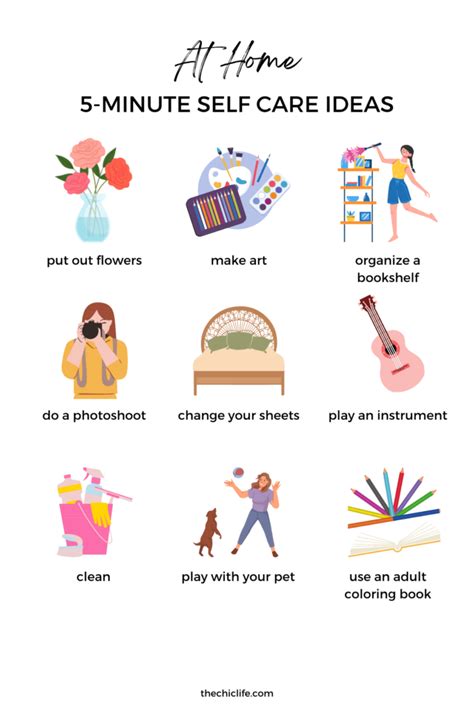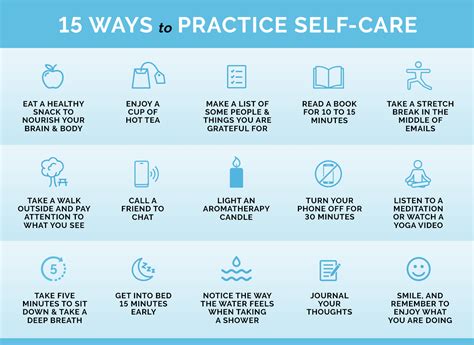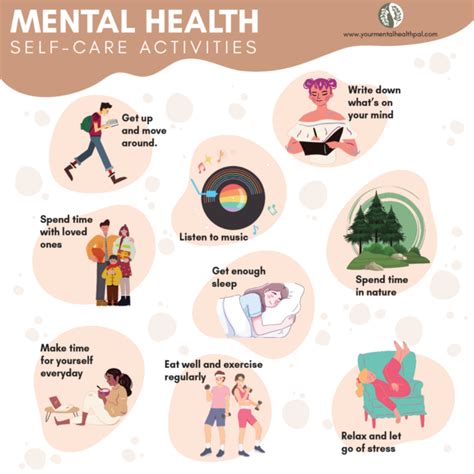Intro
Boost well-being with simple self care tips, prioritizing mental health, stress relief, and mindfulness techniques for a healthier lifestyle.
Taking care of oneself is essential in today's fast-paced world, where stress and anxiety can easily become overwhelming. Simple self-care tips can make a significant difference in improving overall well-being, increasing productivity, and enhancing mental health. By incorporating these tips into daily life, individuals can better navigate life's challenges and cultivate a more positive, resilient mindset. Self-care is not a luxury, but a necessity, and it's crucial to prioritize it to maintain a healthy work-life balance.
Incorporating self-care into daily routines can be straightforward and doesn't require significant lifestyle changes. It's about making conscious choices that promote physical, emotional, and mental well-being. Whether it's taking a few minutes each day to meditate, engaging in physical activity, or simply taking a relaxing bath, self-care practices can be tailored to fit individual needs and preferences. The key is to start small and be consistent, allowing self-care to become an integral part of daily life.
The importance of self-care extends beyond personal benefits, as it can also positively impact relationships and overall quality of life. When individuals prioritize their well-being, they become more patient, empathetic, and understanding, leading to stronger, more meaningful connections with others. Furthermore, self-care can improve concentration, boost energy levels, and enhance creativity, making it an invaluable investment for both personal and professional growth. By embracing simple self-care tips, individuals can embark on a journey of self-discovery, empowerment, and lasting wellness.
Understanding Self Care

Benefits of Self Care
The benefits of self-care are numerous and well-documented. Some of the most significant advantages include reduced stress and anxiety, improved mood, and enhanced resilience. Self-care can also lead to better physical health, as it encourages healthy habits and lifestyle choices. Additionally, prioritizing self-care can improve relationships, as individuals become more empathetic, understanding, and patient. By making self-care a priority, individuals can experience a profound positive impact on their overall quality of life.Simple Self Care Practices

Creating a Self Care Routine
Creating a self-care routine can help make self-care a consistent part of daily life. Here are some steps to follow: 1. Identify personal needs and preferences: Reflect on what activities bring joy, relaxation, and fulfillment. 2. Set realistic goals: Start small and aim to dedicate a certain amount of time each day or week to self-care. 3. Schedule self-care: Treat self-care as any other important appointment and schedule it in the calendar. 4. Be flexible: Don't be too hard on oneself if self-care routines are missed – simply get back on track as soon as possible. 5. Seek support: Share self-care goals and routines with friends and family to gain support and encouragement.Overcoming Self Care Challenges

Self Care for Different Personalities
Self-care is not a one-size-fits-all approach; different personalities may require unique self-care strategies. For example: - Introverts may prefer solo self-care activities like reading, writing, or practicing yoga. - Extroverts may enjoy social self-care activities like spending time with friends, joining clubs or groups, or attending events. - Creative individuals may find self-care in expressive activities like painting, drawing, or playing music. - Analytical individuals may prefer self-care activities that involve problem-solving, like puzzles or strategy games.Self Care and Mental Health

Self Care for Stress Relief
Self-care is particularly crucial during times of stress, as it can provide much-needed relief and relaxation. Some effective self-care strategies for stress relief include: - Deep breathing exercises: Focusing on slow, deliberate breaths to calm the mind and body. - Progressive muscle relaxation: Tensing and relaxing different muscle groups to release physical tension. - Mindfulness meditation: Practicing mindfulness to stay present and focused, reducing worries about the past or future. - Journaling: Writing down thoughts and emotions to process and release stress.Self Care in Daily Life

Self Care at Work
Self-care is not limited to personal life; it's also essential in the workplace. Here are some self-care tips for work: - Take breaks: Regularly take short breaks to stretch, move around, and rest the eyes. - Set boundaries: Establish clear boundaries and priorities to manage workload and reduce stress. - Communicate with colleagues and managers: Openly discuss needs, challenges, and concerns to foster a supportive work environment. - Practice mindfulness: Stay present and focused, using mindfulness techniques to manage stress and improve concentration.Conclusion and Next Steps

As you reflect on the importance of self-care and consider incorporating these tips into your daily routine, remember that every small step counts. Whether it's taking a few deep breaths, going for a short walk, or simply enjoying a cup of coffee in peace, self-care is about acknowledging your worth and taking care of your needs. We invite you to share your favorite self-care practices, ask questions, or seek advice in the comments below. Together, let's prioritize self-care and cultivate a community that values and supports the well-being of all its members.
What is self-care, and why is it important?
+Self-care refers to the practice of taking care of one's physical, emotional, and mental health. It's essential for maintaining a healthy work-life balance, reducing stress and anxiety, and improving overall well-being.
How can I incorporate self-care into my busy schedule?
+Start small by dedicating a few minutes each day to self-care. This could be as simple as taking a short walk, practicing deep breathing exercises, or enjoying a cup of coffee in peace. Be flexible and find activities that fit your lifestyle and preferences.
What are some common self-care challenges, and how can I overcome them?
+Common self-care challenges include lack of time, guilt or shame associated with taking time for oneself, and difficulty in identifying enjoyable self-care activities. To overcome these challenges, reframe self-care as a necessity, start small, and explore different practices to find what works best for you.
